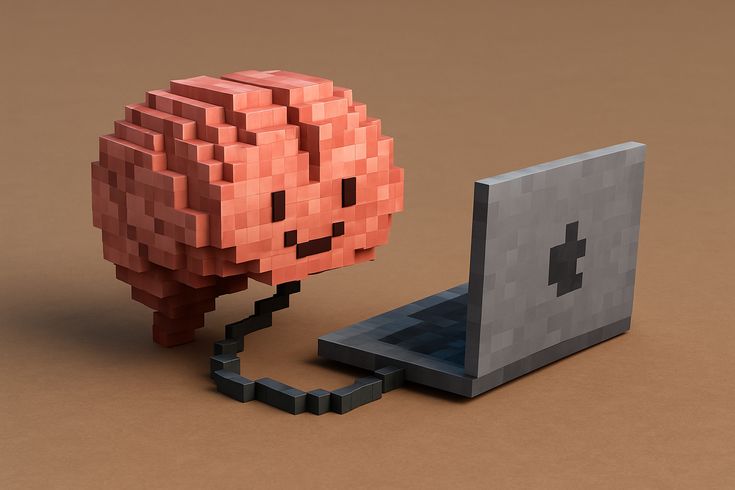I woke up today never knowing i will have a thought about brain computer interfaces. It started casually while i was scrolling through Google, chasing a quick answer to something else, when a headline about BCIs grabbed me and my curiosity took control . I clicked, read a bit, then read some more, before I knew it, I’d gone down to videos, case studies, and opinion pieces. I decided to share what I learned and how I feel about it.
 Source
Source
At its core, a brain computer interface (BCI) is a system that listens to the brain’s electrical activity and translates it into actions a computer can understand like moving a cursor, typing a word, or even controlling a robotic arm. Some BCIs are invasive, this means they're surgically implanted while others are non-invasive which are devices like headsets with electrodes. The possibilities of BCI is thrilling,imagine how people with paralysis moving again, those locked inside their bodies finally communicating, and maybe one day, seamless control of devices with pure thought.
But yet each time i think about it,a question comes to my mind that gets things complicated. Is it healthy? The honest answer is it depends on the type. In invasive BCIs, there’s real surgical risk like bleeding, infection, scarring in the brain. Even when the surgery goes well, electrodes can degrade or shift over time causing real danger as it exposes one to cancer cells, and your brain itself changes as it learns and adapts. That neuroplasticity is a double edged sword it’s what makes BCIs work by allowing the brain learn to talk to the device, but it also means the system needs constant calibration to stay accurate. Non-invasive BCIs avoid the dangers involved in invasive BCIs, which I like because it's quite safer, but they’re less precise, so they often can’t achieve the perfect control people see in flashy demos. Although there are some health questions arising in this area,areas like could stimulation or long sessions of intense focus trigger headaches, mood changes, or sleep issues? The research is promising, but not guaranteed safety. My personal stance on this will be that such BCI be used for therapy while regaining a lost function, i believe the health trade off can absolutely be worth the risk but for a for a healthy person chasing enhancement,ooush! I’d be a lot more cautious.
Beyond the risks let’s talk advantages. I think the most the obvious one is independence. Imagine being able to text a family member without help, steer your wheelchair with your thoughts, or control a prosthetic hand to pick up a glass of water, That’d be amazing. BCIs can also help clinicians monitor seizures, track recovery, or tailor neurorehabilitation more precisely. On a broader level, the human machine interface could get smoother for everyone. Picture a hands free computing that actually understands intention, not just voice commands.
The disadvantages, though, are not small. First, let's consider privacy, Neural signals are the rawest kind of data that can ever exist, it's closer to your inner life than anything you can think of, naturally no one should store it but when neural tech comes in, these questions may arise,Who stores it? Who profits from it? What happens if it gets hacked or sold? The idea of “targeted ads”* based on my brain activity makes my skin crawl. Second, the social vibe will definitely have a glitch , Will people treat users with BCIs as superhuman, or suspiciously as less human? I can see both reactions. And finally, dependence, what happens when a person’s life becomes entangled with a device that needs maintenance, updates, subscriptions? Losing access wouldn’t just be inconvenient,it could feel like losing a part of yourself.
How the world accepts BCIs is going to be messy and uneven. Medically, I think acceptance will come fastest, most people are comfortable with the idea of using advanced tech to restore a natural function. We already accept pacemakers and cochlear implants; BCIs for movement or communication will likely follow that path. I'm certain where society will wrestle is with enhancement,memory boosts, attention amplification, or thought driven control as a lifestyle choice. Some communities will embrace it as the next logical step; others will see it as crossing a line especially the spiritually, ethically, and culturally inclined people.
So, is BCI healthy for us as a society? I think it can be, if we only we can play with the right rules early enough. That means strict data ownership, i mean to say your brain data is yours, full stop, consent that’s clear and ongoing, independent audits of safety and accuracy, and equitable access embedded from the start.
My final take is this; I’m optimistic with boundaries, I’m firmly in support of therapeutic BCIs that restore lost function; the human wins are too powerful to ignore. For enhancement, I’m not anti-future alright so don't get me wrong,I’m just not willing to outsource parts of my mind to systems that aren’t yet transparent, proven, and meaningfully under the user’s control. If BCIs are going to sit this close to who we are, then they have to earn our trust every single day. Until then, I’ll keep reading, keep asking annoying questions about privacy and keep rooting for the people whose lives could be transformed by this tech.
Posted Using INLEO